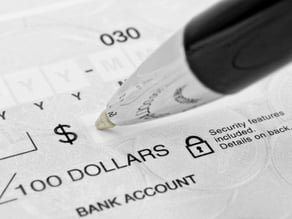The Fight Against Check Fraud
 Washing Isn’t Just for Clothes Anymore
Washing Isn’t Just for Clothes Anymore
Despite the decline in the use of paper checks, check fraud is still a major concern as criminals are finding new ways to exploit the system. In fact, according to the U.S Department of Treasury, check fraud through mail theft has increased by over 80% between 2021 and 2022. This raises the question of how this type of fraud is committed and how it is being handled more sophisticatedly.
Let's talk about check fraud.
Check fraud is a type of financial crime where criminals steal or replicate your checks and use them to withdraw money from your bank account. It's a serious concern that can result in significant financial losses if not addressed promptly. Criminals commit mail theft check fraud by targeting the U.S. Mail to steal personal, business, and government checks by going into a mailbox and either fishing out specific pieces of mail or removing the mail left behind for your postal worker to pick up. Some fraudsters target the blue USPS drop boxes found along the street, using keys they obtained through theft or copying from post office officials.
Then what?
Once the check is obtained, criminals engage in a common method of check fraud known as check washing. They use chemicals to dissolve the ink and remove the "payee" field. This allows them to write in fake names and alter the amount the check is written for. In some cases, criminals may even upload a "clean" version of the check to online fraud marketplaces or use it to steal the victim's identity and apply for loans or access their bank accounts. One of the most insidious aspects of check washing is that the victim may not even realize that their check has been tampered with. The altered check may still look legitimate, with no obvious signs of tampering.
Why is it important to know about check fraud?
Due to the increase in check fraud, financial institutions, especially smaller ones, are facing difficulties in recovering funds from fraudulent checks. Therefore, banks are now closely monitoring their branch operations and mobile check deposit services, particularly for significant check deposits, to identify potential signs of fraud. While financial institutions are taking steps to prevent fraudulent activities, it is crucial for you to remain vigilant and take proactive measures to reduce the risk of check fraud.
How can I protect myself from check fraud?
To safeguard yourself against check fraud, it's best to avoid sending checks through the mail. If you have no choice, make sure to drop them off directly at the post office and avoid using the blue USPS boxes. Alternatively, you can opt for electronic payments through your bank's online bill pay service or the merchant's website.
Additionally, businesses can protect themselves by signing up for a "positive pay" service offered by their bank. This pre-authorizes checks for a specified amount and check number, creating another line of defense by helping to prevent criminals from altering the amount or creating fake checks.

What else should I look out for?
As fraudsters become increasingly aggressive in their efforts to steal money, unauthorized fraudulent payment attacks take various forms beyond check fraud. These attacks involve any fraudulent activity that results in an unauthorized transfer of funds from an individual or company's account. In recent years, banks have observed four other types of trends: technical support fraud, phishing, push payment social engineering, and romance scams.
1. Technical support
In technical support scams, cybercriminals masquerade as representatives from legitimate tech firms or antivirus software providers. They may contact you via phone or email, claiming that your computer has a virus or issue that requires immediate attention. The perpetrator then requests remote access to your device to "fix" the problem, during which time they may obtain your personal information or financial credentials. To add insult to injury, they may even charge you a fee for this "service."
2. Phishing
One of the most successful and long-standing forms of fraud is phishing. Scammers will send emails or text messages impersonating a legitimate institution and requesting personal information or login credentials. These messages often contain links to fraudulent websites designed to mimic the real thing. Once they have your information, they can easily commit identity theft or gain unauthorized access to your financial accounts.
3. Push payment social engineering
Push payment social engineering is a type of fraud where scammers manipulate victims into voluntarily sending them money. This can take the form of posing as a government agency demanding payment for false fines, impersonating a family member in need of urgent funds transfer, or even pretending to be a potential new employer requesting payment for equipment to complete a work-from-home job. It's crucial to stay alert and cautious when dealing with such requests to avoid falling victim to these scams.
4. Romance scams
The rise of online dating and socializing has led to an increase in romance scams, where fraudsters create fake profiles to lure in unsuspecting victims. They may use catfishing techniques, incorporating fake identities and photos, to gain their trust and eventually persuade them to send money. It's important to be cautious when engaging in online relationships and to keep an eye out for any suspicious behavior.
As criminals constantly come up with new ways to scam people out of their hard-earned money, it's important to stay vigilant and informed about the latest schemes. Keep a watchful eye on your payment methods and be aware of any evolving scams. If you require additional assistance or information on how to protect yourself and your accounts, don't hesitate to reach out to your local financial institution. They are there to help you keep your finances safe and secure.
Information courtesy of the Osgood Bank fraud department
Related Articles: Fraud Prevention